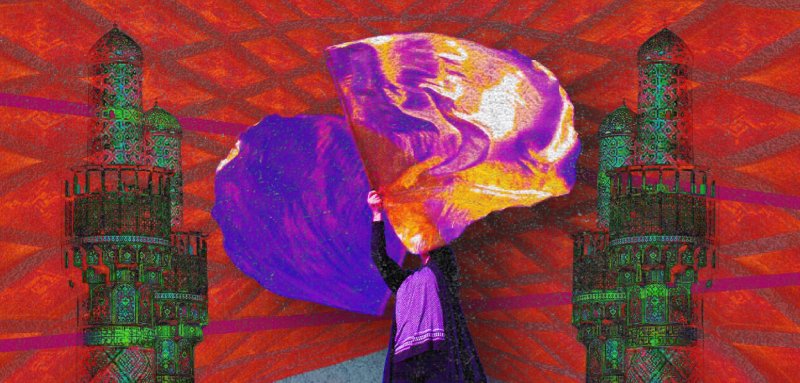We Iranians do not worship fire. That’s a misconception. All the natural elements were holy for pre-Islamic Iranians — air, water, earth, and fire. But, it was fire that needed to be tended to, and thus shrines and temples were built for it. Azerbaijan is named after these temples; 'the standing place of fire'. The Iranian city of Yazd houses a sacred flame that has been burning for more than 1,500 years.
"Respect the fire", my father would say. If you light candles for the Nowruz celebrations, just let them go out on their own. Don’t snuff them out before their time. We jump over the fire every year, just before the arrival of spring, to gain its strength, and so that it would burn our impurities away. We also do not burn our dead. That custom belongs to our Hindu neighbors to the east — one that is as foreign to us as the Greek custom of burying the dead to the west. In towers of silence our loved ones would lay, exposed to the elements, eaten by birds.
We Iranians do not worship fire. That’s a misconception. All the natural elements were holy for pre-Islamic Iranians — air, water, earth, and fire. But, it was fire that needed to be tended to, and thus shrines and temples were built for it.
When my mother passed away this autumn, we didn’t know where to bury her. Would it be in the wet soil of the Netherlands where she's lived the last forty years of her life? Or within the ground of her native homeland Iran? I couldn’t imagine us standing at her grave in the Dutch rain under a gray sky. It would have been even worse to send her to Iran, knowing I might not be able to visit her in this life. Even if her religious sister demanded it: "Send her to us, Sahand jan, we will take care of everything. We will cover the costs."
The deciding argument was a linguistic one. While looking into articles about cremation, I noticed some didn’t call it 'burning' in Persian. Rather, from the term we use for burial, 'trusting to the soil', a new term had been created; 'trusting to the fire'. "Yes," my father said, "This, I can commit to."
When my mother passed away this autumn, we didn’t know where to bury her. Would it be in the wet soil of the Netherlands where she's lived the last forty years of her life? Or within the ground of her native homeland Iran?
I apologized to my aunt. I know it’s against our customs, but I want to keep my mother close until the day I can come to Iran, carry her in my arms, and put her in the soil myself. Unspoken were the words: 'It will be on the day that the rulers you revere close shop and leave. My heart will mend the day your heart breaks.'
In the ancient tales of Iran, the hero Siyâvash is accused by his mother-in-law of raping her. Like the biblical Joseph, he had spurned the advances of a woman who was in love with him and had to pay a heavy price. But unlike Joseph, he did not incur his punishment. Instead of being thrown in prison, he consented to a 'trial by fire'; massive flames were created through which he and his horse must walk across and reach the other side unharmed if he really was as pure as he claimed. In the story, he of course was. He did reach the other side, coming out of the flames unscathed.
Today Iran witnesses another trial by fire. This week, in just one night, protesters burned seminaries, the headquarters of paramilitary forces, the offices of parliamentary representatives who had voted to execute those arrested for protesting, banners bearing the faces of the heroes of this regime, and even the childhood home of the late leader Ayatollah Khomeini. They are not made of the same substance as that of Siyâvash. When their homes and images burn, they blacken and curl up. I don’t know if my mother’s sister reads the news the way I do. I believe the fires leave behind a purer Iran. I’m sure she’s appalled at the destruction.
I do not worship fire, but I wish for one of the protesters to capture one of the flames that burned away the impurities of my homeland. I hope the flame will be kept in a simple shrine.
I do not worship fire, but I wish for one of the protesters to capture one of the flames that burned away the impurities of my homeland. I hope the flame will be kept in a simple shrine. I will take the ashes of my mother there and say, "Look, the fire that burned inside of you when you had to leave your country — the one that burned inside all of us — finally found a way out." It drove them away in a rage. Now it’s calm and we’ll keep it as a reminder of what our rage is capable of. Then, I will bring her out to give her to the other elements — the air, the water, and the earth.
Raseef22 is a not for profit entity. Our focus is on quality journalism. Every contribution to the NasRaseef membership goes directly towards journalism production. We stand independent, not accepting corporate sponsorships, sponsored content or political funding.
Support our mission to keep Raseef22 available to all readers by clicking here!
Interested in writing with us? Check our pitch process here!





